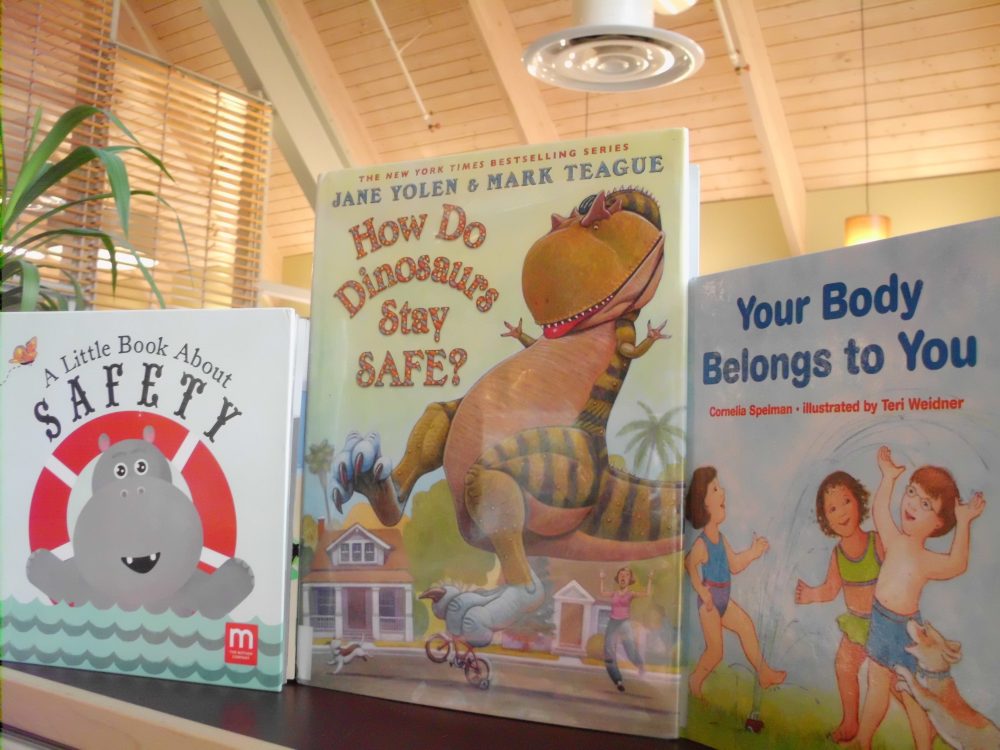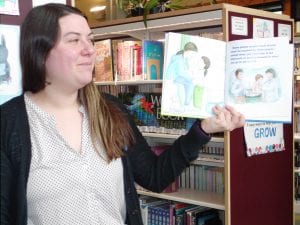
A few safety books for young readers available at the Ketchikan Public Library (KRBD staff photo by Maria Dudzak).
Earlier this month the Ketchikan Public Library held a special “Keep Me Safe” story time. Stories about personal and body safety were shared with preschoolers.
Sometimes boisterous and on the move, other times engaged and attentive, a group of more than 20 toddlers listened to stories about what to do when you need help or don’t feel safe. Guest storyteller Arika Paquette is the prevention and education manager with Women in Safe Homes.
“April is Child Abuse Prevention Month. Since the school district has curriculum, we try to reach out to all the preschools and (find) opportunities to reach littler kids where parents and children might not be getting information because they’re not in school yet.”
Paquette says it’s important for young children to know their own names, their parents’ or guardians’ names and their phone number.
“That’s something you can start practicing pretty early, even before your kids really know the numbers themselves. They’ll start to pick up the phone number.”
She says if children get lost, they should be taught to stay where they are.
“Because oftentimes kids will end up wandering much further away. So teaching your kids that if they get separated not to go looking for you, that you’ll go looking for them.”
To illustrate these and other concepts, Paquette read three stories. The first was “How Do Dinosaurs Stay Safe.” The story offers tips ranging from holding hands when crossing the street to what to do when encountering strangers. After reading the book, Paquette asked the children questions.
“It’s very important that we always ask our safe grownup who’s taking care of us if we’re allowed to talk to a stranger or pet their dog. And should we ever take candy from strangers or food or gifts? …No.”
She also read “A Little Book About Safety” featuring Hugo the Hippo. In the story, the main character goes to the pool with his family and faces issues of pool safety, being asked to keep secrets and getting lost. Paquette offered advice on what to do if you don’t feel safe.
“And this is something that we all feel. Sometimes we get a feeling in our tummy. We might feel like our tummy hurts if something is making us scared. Or maybe it’s not something that we should be doing. So that is something important to listen to.”
Paquette read and later handed out copies of the book “Your Body Belongs to You.” She says this story helps young children understand appropriate and inappropriate touching.
“And one of the earliest things you can do is teaching your kids the correct names for their body parts, and also teaching them that they can say ‘no’ to any touch, even if that’s from a relative or a friend. So not forcing your kids to give goodnight kisses if they don’t want to, and really teaching them that they can set boundaries for their own bodies.”
Most of the children attending were 2 or 3-year-olds. Children’s librarian Amanda Kiely says it’s never too early to start discussing personal safety with your children.
“That is something that I read over and over is that it’s never too early to start talking to your kids about these things. Especially really young kids because they don’t have the language yet to communicate what is happening. So they really need to know what to do in these situations. So yeah, it’s never too early to start.”
Kiely suggests starting with simple concepts, such as how to safely cross the street, and building up to more complex topics.
Both Kiely and Paquette say the library has appropriate materials for a variety of age ranges. They say online resources are also readily available.






